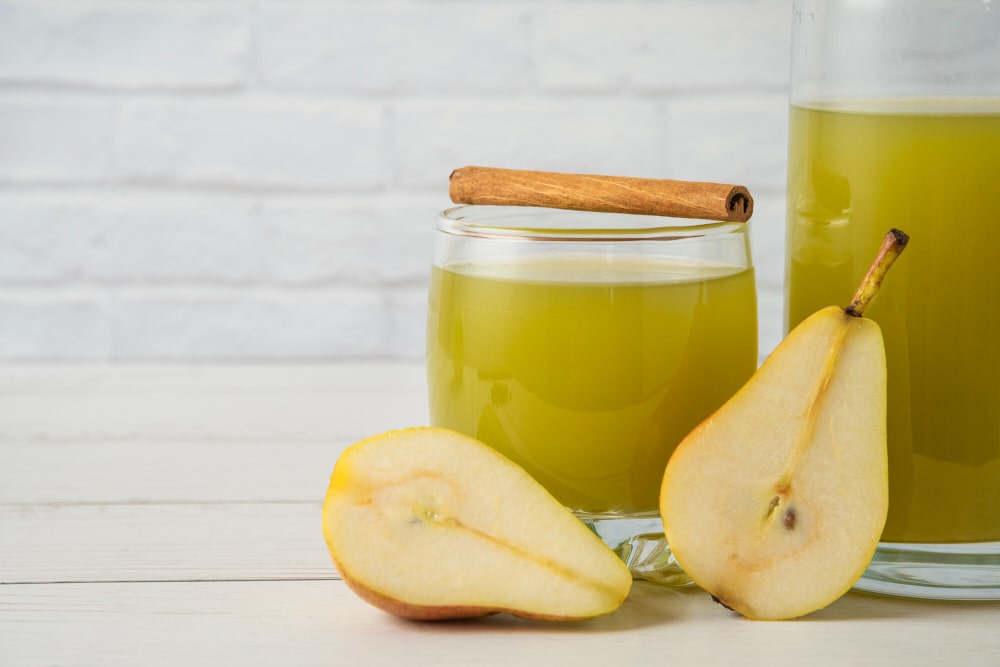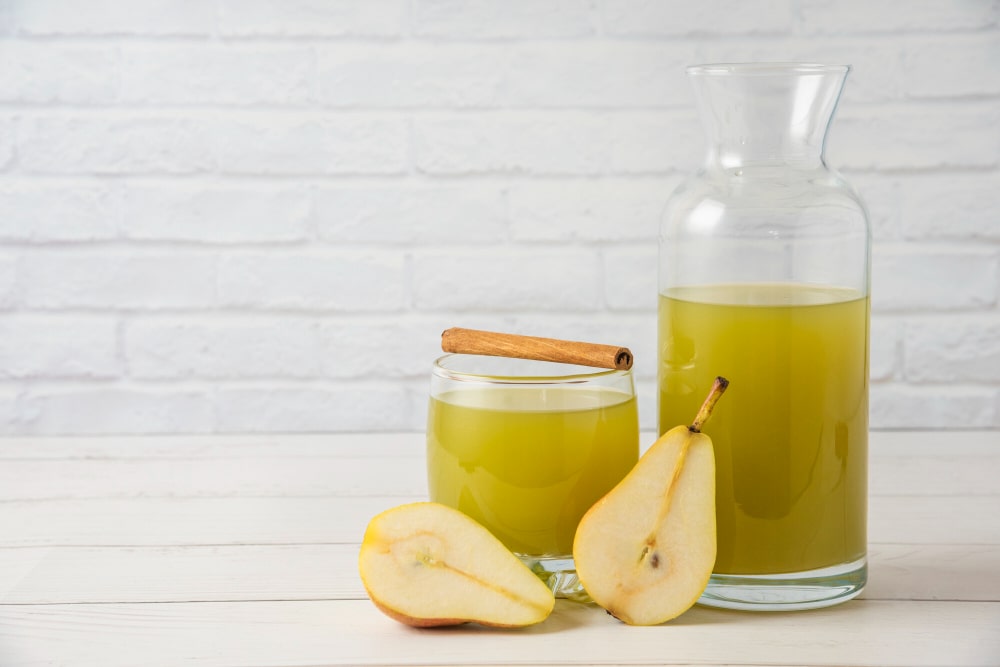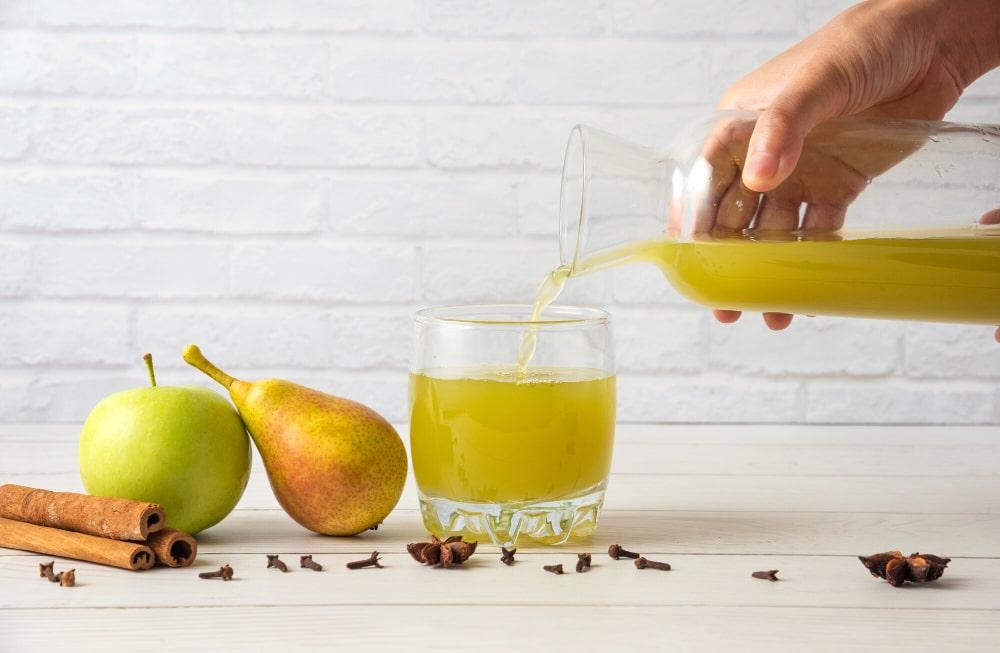Constipation is a common digestive disorder characterized by infrequent bowel movements, difficulty defecating, and hard stools. Many factors, including lack of physical activity, certain medications, and poor diet, can cause constipation. Pear juice has been used for centuries to help alleviate constipation symptoms due to its rich source of dietary fiber and natural laxative qualities. In this article, we’ll explore the many benefits of pear juice for constipation and discuss how to incorporate it into your digestive routine.
The Nutritional Benefits of Pear Juice
Pears are a nutrient-rich fruit that contains vitamins A, C, and K and minerals like potassium and magnesium. Additionally, pears are a good source of dietary fiber, containing both soluble and insoluble fiber. Soluble fiber helps slow digestion and keeps you feeling full for longer, while insoluble fiber helps speed up digestion and prevents constipation. Pears also contain natural sugar, which can help boost your energy levels when constipation is caused by fatigue.

Nutrition Facts of Pear Juice
| Components | Quantity per cup |
| Carbohydrates | 28.86 g |
| Protein | 0.39 g |
| Dietary Fiber | 4.3 g |
| Vitamin A | 0 IU |
| Vitamin C | 8 mg |
| Vitamin K | 2.4 mcg |
| Potassium | 160 mg |
| Magnesium | 8 mg |
What is Constipation: Causes and Concerns
Constipation results from several factors, including a lack of dietary fiber, insufficient water intake, and low physical activity. It can also be caused by certain medications or an underlying medical condition. Constipation can lead to further complications such as bloating, abdominal pain, and nausea. Therefore, it’s essential to take action as soon as possible to prevent any additional discomfort.
Read More: Pineapple Orange Juice: Benefits, Recipe, Nutrition Facts
Pear Juice: Your Digestive Elixir
Pear juice is a natural remedy for constipation due to its richness in dietary fiber and soothing properties. The active ingredients in pear juice work together to move food along the digestive tract and loosen stools, making it easier for them to pass through the intestines. Additionally, due to its high fiber content, pear juice can help you feel fuller for longer, reducing the urge to snack and aiding in weight loss.
How Does Pear Juice Work?
Pear juice works by stimulating the digestive system and loosening stools. The dietary fiber in pears is thought to be an effective treatment for constipation due to its ability to absorb water as it passes through the intestines. This makes the stool softer and easier to pass. Additionally, pear juice contains natural laxatives, which further reduce constipation symptoms.
Benefits of Pear Juice

The Rich Fiber Content
Pears are rich in both soluble and insoluble fiber, making them an excellent choice for those suffering from constipation. Soluble fiber helps slow digestion and keeps you feeling full for longer, while insoluble fiber helps speed up digestion and prevents constipation. Pears are also a good source of dietary fiber, containing both types of fibers in an optimal ratio.
Read More: How to Make Mango Nectar Juice: A Taste of Tropical Paradise
Soothing Effects on the Gut
The natural laxatives in pears can help soothe the digestive system and reduce constipation. The active ingredients in pear juice helps to stimulate the digestive tract, relaxing it and reducing bloating and abdominal pain. Additionally, the natural sugars found in pears can provide an extra boost of energy when constipation is caused by fatigue.
Incorporating Pear Juice Into Your Routine
Pear juice is a great way to relieve constipation symptoms naturally. Incorporating it into your daily routine can help you maintain regularity and ensure long-term digestive health.
Fresh Pear Juice vs. Packaged Varieties
Fresh pear juice is the most effective way to relieve constipation symptoms due to its rich nutritional content. However, store-bought varieties are also available and can be just as effective. When choosing a packaged product, check the ingredients list and opt for varieties without added sugar or preservatives.
Read More: Apple Juice for Constipation: A Natural Remedy for Digestive Relief
Recommended Daily Consumption
It is recommended to consume 8 ounces of fresh pear juice per day to get the most benefit from its laxative properties. If using a store-bought variety, follow the directions on the packaging for best results.
Combining with Other Remedies
Adding pear juice to your existing constipation treatment plan can be beneficial. It is recommended to combine it with other natural remedies, such as prunes and probiotics, as well as lifestyle changes like increased water intake and physical activity.
Pear Juice for Long-Term Digestive Health

Maintaining Regularity
Regularly consuming pear juice can help maintain regularity and reduce constipation symptoms. The natural laxatives in pears can help keep the digestive system functioning optimally, ensuring long-term digestive health.
Nurturing the Gut Microbiota
The dietary fiber in pears is an excellent source of nutrition for beneficial gut bacteria. Consuming pear juice regularly can help nourish the gut microbiota and promote optimal digestion. This can further reduce constipation symptoms and improve overall digestive health.
Read More: Benefits of Green Juice: How to Make Green Juice at Home?
Is Pear Juice Suitable for Everyone?
Pear juice is safe for most people to consume. However, pregnant women and young children should consult a healthcare provider before adding it to their diet. Additionally, those with diabetes should be aware that pear juice contains natural sugars that may not suit them.
Potential Side Effects and Precautions
Monitoring Your Sugar Intake
Pear juice contains natural sugars and should be consumed in moderation. Regularly consuming too much can lead to weight gain and blood sugar spikes, so it’s essential to monitor your intake. Additionally, those with diabetes should use caution when drinking pear juice as the natural sugars may have an adverse effect on their condition.
Allergic Reactions
Though rare, some people may experience an allergic reaction to pear juice. Symptoms of an allergic reaction may include hives, itching, swelling of the face or throat, and difficulty breathing. If you notice these symptoms after drinking pear juice, seek medical attention immediately.
Pear Juice and Weight Gain
Despite its naturally sweet flavor, pear juice does not cause weight gain. In fact, the dietary fiber in pears is known to help reduce hunger cravings and keep you feeling full for extended periods. This helps prevent overeating and can support healthy weight loss efforts.
Read More: Sugar Free Cranberry Juice: Easy to Make at Home
Side Effects
In some cases, consuming too much pear juice can lead to side effects such as bloating, cramping, and diarrhea. These symptoms can be uncomfortable but are usually harmless. If you experience these symptoms after drinking pear juice, reduce your consumption and try a different remedy for constipation relief.
Pear Juice and Hydration: A Dual Advantage
In addition to providing relief from constipation symptoms, pear juice is a great way to stay hydrated. The natural sugars in pears act as an electrolyte and can help replenish lost fluids, making it an ideal drink for those prone to dehydration. For best results, choose the unsweetened varieties of pear juice and combine them with adequate water intake for optimal hydration.
Read More: Top 11 Cucumber Juice Benefits: How to make Cucumber Juice?
Ingredients and Instructions for Making Pear Juice at Home
Making pear juice at home is easy and requires no special equipment. You only need a few pears, a blender or juicer, and water. Here’s how to do it:
Ingredients:
- 4 ripe pears (green or red varieties)
- 2 cups of water
Instructions:
Making pear juice at home is easy and affordable. All you need is a blender, pears, honey (optional), ice cubes, and water.
- Start by washing the pears and removing their cores.
- Cut them into smaller pieces and place them in a blender with one to two tablespoons of honey (depending on your taste preferences).
- Add some ice cubes for extra chill and top with cold water.
- Blend until smooth, strain the juice if desired, then enjoy!
Read More: How to Make Aloe Vera Juice: Nutrition Facts, Benefits, Recipes
Additional Ways to Incorporate Pear Juice Into Your Diet
In addition to drinking pear juice, there are other ways to enjoy the health benefits that pears offer. Here are some ideas:
- Add diced pears to your morning oatmeal or yogurt for a nutritious breakfast.
- Make a smoothie using frozen pear cubes, almond milk, and your favorite leafy greens.
- Use pear juice as a base for salad dressings or marinades.
- Incorporate it into baking recipes such as muffins or pancakes.
Conclusion
In conclusion, pear juice is an all-natural remedy for constipation relief that is easy to incorporate into your daily routine. Its natural laxative properties, rich nutritional content, and ability to promote hydration can be a great addition to any treatment plan. When used correctly, this simple remedy can help keep you regular and maintain long-term digestive health. So grab some pears and give this natural remedy a try!
Read More: How to Make Carrot Juice: A Refreshing and Nutritious Drink
FAQs
Results can vary depending on the individual. However, regular consumption of pear juice is known to reduce constipation symptoms in as little as 48 hours.
Yes, you can drink pear juice every day. However, it’s important to monitor your sugar intake and avoid consuming too much at once, as it may lead to adverse side effects.
Pear juice has a naturally sweet, slightly tart flavor that many people enjoy. It can enjoy independently or mixed with other ingredients for flavor and nutrition.
Children over 12 months old can safely drink pear juice in moderation. However, it is essential to consult a healthcare provider before introducing new foods or beverages to an infant’s diet.
Though pear juice does not directly cause weight loss, its dietary fiber content can help keep you feeling full for longer periods and reduce hunger cravings. This can support weight loss efforts and help you reach your health goals.

